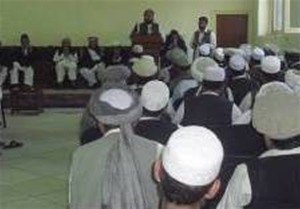
Thirty-five judges from Kunar, Laghman, Nangarhar, and Nuristan provinces attend the provinces’ first continuing legal education training program for judges.
USAID/RLS-Formal
Judges acquire knowledge on modern legal developments in Afghanistan to assist them in making informed and sound cases
7 DECEMBER 2010 | KABUL, AFGHANISTAN
Judges throughout Afghanistan, especially those in the outlying provinces, have historically received little support to enhance their knowledge of legal developments. Their only option was often to base their decisions on superseded and irrelevant laws, or on customary and traditional laws. Partly because the judges lacked education and training, Afghans in those districts and provinces came to rely heavily on the informal sector – shuras and jirgas – to resolve disputes.
A recent judicial training program, which included thirty-five judges from the provinces of Kunar, Laghman, Nangarhar, and Nuristan, was the first in the region to fill this void by providing judges with knowledge and reference material to research and make case decisions grounded in current Afghan law.
These judges braved dangerous roads blocked by Taliban and overcame impassable obstacles to attend the 12-day training program in Jalalabad.
Judge Mohammad Yousef, of the Wala Primary District Court, proved that the judicial training provided practical skills that were immediately applicable. He decided to attend the training program because he felt it would be useful in helping him resolve common disputes in his district. The journey, however, proved to be a difficult feat when the road to Jalalabad was blocked by the Taliban. Unrelenting, Judge Yousef took an alternate route that required him to walk for three days over rough mountain passes. In the end, the knowledge gained was worth the effort. For example, Judge Yousef recently presided over the murder case of a young Afghan girl that would have otherwise been decided by a local jirga, where her rights would have been less protected and she could have potentially faced harsher punishment.
Held in collaboration with the Afghanistan Supreme Court and USAID’s Afghanistan Rule of Law Stabilization — Formal Component project, the training included theoretical and practical sessions on topics such as civil law and procedure, judicial ethics, and fair trial principles. The judicial training is one USAID activity that aims to strengthen the rule of law in Afghanistan by enhancing the capacity of key justice actors in the formal state system.







Comment
Make a general inquiry or suggest an improvement.